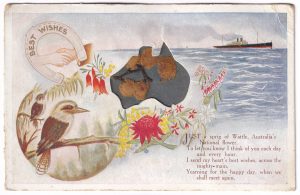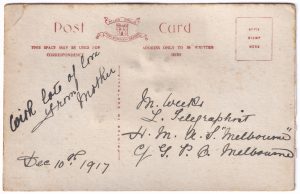[Editor: This postcard, which incorporates a poem, as well as an illustration of some kookaburras, along with some embedded wattle blossoms in an outline of Australia, is dated 10 December 1917, during the First World War (1914-1918); it was sent to a sailor serving on HMAS Melbourne, from his mother.]
Best Wishes
[Front of postcard]
Best Wishes
Just a sprig of Wattle, Australia’s National flower,
To let you know I think of you each day and every hour.
I send my heart’s best wishes, across the mighty main,
Yearning for the happy day, when we shall meet again.
[Description: An illustration of some kookaburras, along with some embedded wattle blossoms in an outline of Australia, as well as some flowers, and a ship; a horseshoe, with the words “Best wishes” and two hands clasped in a handshake, appears in the top left area.]
[Reverse of postcard]
Post Card
Atlas Press
Marlborough Series
— Printed in Australia —
[Handwritten text, in italics]
With lots of love
From
Mother
Dec 10th 1917
[Addressed to:]
M. Weeks
L. Telegraphist
H. M. A. S. “Melbourne”
C/- G. P. O. Melbourne
Source:
Original document
Editor’s notes:
Dimensions (approximate): 140 mm. (width), 90 mm. (height).
The golden blossoms of the wattle tree, which are embedded in the postcard, have turned brown with age; this is not surprising, considering that the postcard is over 100 years old.
C/- = an abbreviation of “care of” (also abbreviated as “c/o”); used to address a piece of mail, or a communication, when it is being sent to an address which is owned or run by someone else, for the receiving person or organisation to pass it on to the person to whom it is addressed
Dec = an abbreviation of “December”
G. P. O. = an abbreviation of “General Post Office”
H. M. A. S. = “Her Majesty’s Australian Ship”, or “His Majesty’s Australian Ship”, depending on the sex of the ruling monarch; a designation given to a base or a ship of the Royal Australian Navy (the designation can be rendered as “HMAS” or “H.M.A.S.”)
H. M. A. S. Melbourne = a ship of the Royal Australian Navy, which was launched in 1912, and decommissioned in 1928; this was the first of three RAN ships of the same name, the second was launched in 1945 (decommissioned in 1982), and the third was launched in 1989 (decommissioned in 2019)
See: “HMAS Melbourne (I)”, Royal Australian Navy
2) “HMAS Melbourne (1912)”, Wikipedia
L. Telegraphist = an abbreviation of “Leading Telegraphist”
main = the high sea, the open ocean


Leave a Reply